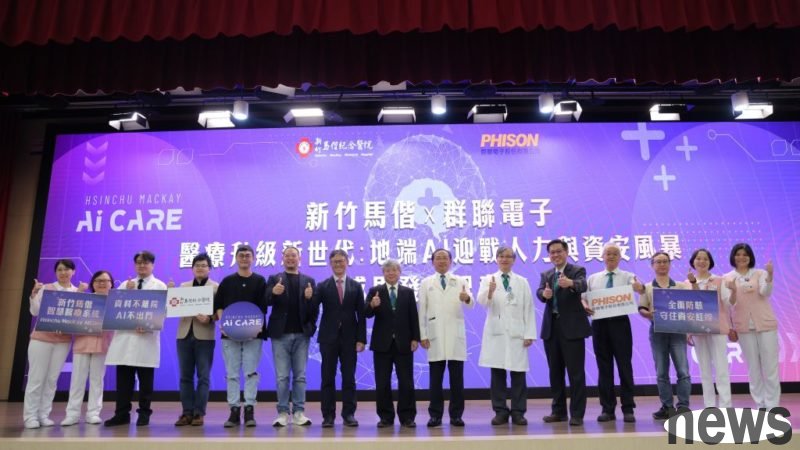
Hsinchu Mackay Medal Hospital announced that it will first introduce the "local-end generation AI system" to create a smart medical model that will not only significantly reduce the burden on the first-line medical care, but also maintain the medical data safety and defense line. In addition, the reporter of this result will showcase a number of implementation applications and officially launch the Hsinchu MacKay AiCare system to show a new classic that integrates medicine and technology and takes patients as the core.
Chairman of the MacKei Hospital said, "This time we work with Group Electronics to jointly create a local generation AI system, officially named "Hsinchu MacKei AiCare Smart Medical System". The system combines the spirit of Dr. MacKei's benevolent and modern smart technology, symbolizing that we use "love" and "wisdom" As the core value, we should protect the health and well-being of patients and the safety of medical data. This is not only a specific manifestation of the implementation of technology in clinical practice and enhance medical value, but also an important milestone for Hsinchu Mackay to smart medicine. ”
College Telecom said that medical staff have been overwhelmed by heavy administrative and documentary pressures for many years. In order to make the doctor return to human-oriented, Hsinchu Mackay has introduced multiple generative AI modules to directly design the four most common pain points in the medical field, including the most common medical treatment assistance book writing, pre-art knowledge and multi-language translation, hospital knowledge intelligent management, medical conference speech summary, public education robot and other modules.
Hsinchu Ma Keith Hospital President Weng Tonglong emphasized that AI is not about replacing us, but about becoming the most realistic second assistant. These applications can effectively divide the work of literature and let medical attention return to the patient. At present, the AiCare system has also been expanded to Hsinchu City Mackay Children's Hospital, realizing cross-hospital integration and resource sharing. We are also actively researching and developing early evaluation tools assisted by AI, hoping to help the first line improve efficiency and record quality, so that children's development status can be mastered earlier and intervened early.
Pan Jiancheng, executive director of group electronics, pointed out that the real value of AI lies in whether it can penetrate into the local area and solve actual problems. Unlike traditional cloud AI, we have built a safe, responsible and generative AI system with Hsinchu Mackay through the aiDAPTIV+ platform, allowing local AI to truly enter the clinic for the first time. While improving care efficiency, we also respond to the medical patient-centered core value. What’s more important is that the AI system completes model training and recommendations on the in-hospital server throughout the entire process, so as to ensure that medical AI data does not leave the hospital, effectively preventing invasion of customers, maintaining the bottom line of data security, and eliminating suspicion of data ejaculation.
Group electronics emphasizes that training large-scale language models of traditional 70B parameter levels often requires multiple high-level GPU servers to connect in series. The construction and maintenance cost is high, making it difficult to become popular in medical fields. The aiDAPTIV+ platform developed by Group Electronics successfully breaks the computing door through innovative data flow and cache architecture design, allowing the ground-end server to execute the micro-tuning training process of large language models, greatly reducing the technical door and deployment burden of AI entering the medical field, and realizing the ability of AI models to "operate training" in the hospital.
In addition, when traditional models process long inputs, they often need to convert the entire segment of content into vectors and calculate attention weight to establish the initial understanding of the model and perform the so-called pre-filling calculation. This process can easily cause delays in response and is difficult to support clinical decisions immediately. To this pain point, aiDAPTIV+ memory technology further optimizes the recommendation process, and can maintain high-speed response even when a large amount of data is input. According to the test, its local recommendation speed has surpassed traditional cloud services and high-level GPU servers, bringing more real-time and stable AI aid capabilities to the medical field.